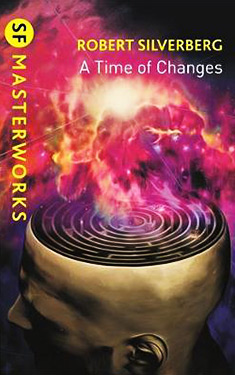Robert Silverberg
Completed 1/12/2021, Reviewed 1/12/2021
3 stars
I’ve read two book by Robert Silverberg, Gilgamesh the King and Son of Man. This book was like the latter: strange and somewhat difficult to understand. I really liked the writing of all three though. I think Silverberg is probably one of the more literary science fiction writers, with excellent prose. Sometimes though that can be a downfall, and it sort of was here. This book is almost all prose with little plot. It tells the life story of a man on a planet long ago colonized by Earth who discovers a drug that lets him break through the culturally embedded philosophy of the destruction of self and discovers that to truly love, he must truly be in touch with himself. It goes on and on about his life and doesn’t get to plot until well after halfway through the book. Nonetheless, it won him the Nebula in 1971 and was one of his many Hugo nominations.
Kinnal Darival is the second son of the Septarch of a province on the planet Borthan. When his brother ascends the throne, Kinnal takes a self-imposed exile to avoid being his rival. He settles in another province where he marries, has children, and becomes a powerful noble. One day, he meets Schweiz, a merchant from Earth. Schweiz engages him in a debate about religion and the Covenant, the law set down by the original colonists which requires people never use the pronouns I, me, my, or mine. Basically, it implies the destruction of self. Schweiz argues that it is actually a very selfish law, where people are completely self-absorbed because they are not allowed to fully engage with others and look outside of themselves. He offers Kinnal a drug from the southern continent, where the original dissenters of the Covenant fled. When taken with another person, it allows both people to fully experience each other’s existence. Kinnal’s experience is transformative. He wants to share this with his people even though it is illegal and an abomination. This begins his downfall.
Ironically, the book is written in first person perspective of Kinnal. He documents his journey of self-discovery to share with the world to incite a social revolution and bring down the old Covenant. The build-up of the plot is very slow, but we get excellent world-building and characterization of Kinnal. As Schweiz so clearly sees, Kinnal, like everyone on the continent, is very self-absorbed. But Kinnal doesn’t see it. As part of the world-building, we hear the story of how the gods and the Covenant came to be. Kinnal is agnotic, but of course being brought up in the culture, he adheres to the Covenant and the mythology. With his discovery of Schweiz’s drug, he becomes a savior of sorts, trying to convert everyone to the new experience, and potentially, a new Covenant.
One interesting construct on this world is that of bondbrothers and bondsisters. Everyone has one of each, chosen at birth to be very close friends with. It creates a sense of connectedness in a world without connection. A person is generally most honest with their bondsiblings, as well as with their drainer, a priest who is a person’s confessor. Kinnal’s bondbrother is Noim and his bondsister is Halum. When Kinnal goes into exile, he forgoes his relationship with them. In one way, this is good because he is deeply in love with Halum, and having a physical relationship with a bondsibling is taboo. Noim and Halum, with Schweiz, are the only other characters who get any development.
I
give this book three stars out of five.
The prose and the world-building are excellent, but the pace is tedious
and the plot thin. The book is only 220
pages, but it took me five days to read.
This is really slow for me. I
wonder if the Nebula Silverberg won for the book was more of a lifetime achievement
award rather than for its merits. He
wrote over a hundred science fiction and fantasy novels as well as nonfiction
and erotica. He’s definitely one of the
most prolific genre writers of any generation.
I just don’t think this one was award-worthy.

No comments:
Post a Comment